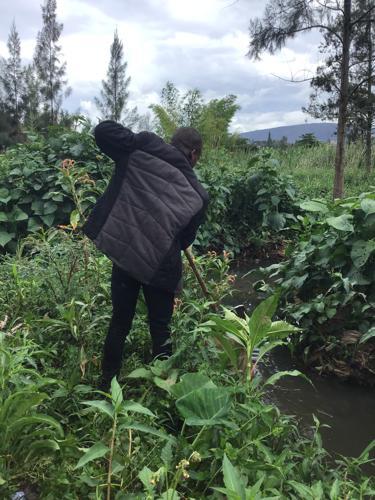Project Progress

Comprehensive Biodiversity Research and Monitoring for Restoration Success in Kigali's Urban Wetlands
Author: Desire Bikorimana
Affiliation: Biodiversity Nexus Student Association, UR-CST
Contact Information: [email protected], +250780784924
Introduction/Background
Context:
Kigali's urban wetlands, once rich in biodiversity, have suffered extensive degradation due to human and industrial encroachment. The Kigali Urban Wetland Master Plan, unveiled in September 2021, identified 15.76 square kilometers of wetlands requiring urgent restoration to reclaim their ecological function. These wetlands are critical habitats for numerous species and play a vital role in flood mitigation, water purification, and carbon sequestration. The Rwandan government, with support from international partners, has committed substantial resources to restore these ecosystems. However, the success of these restoration efforts hinges on comprehensive biodiversity research and monitoring.
Relevance:
Robust biodiversity monitoring is essential for assessing the effectiveness of restoration activities and ensuring long-term ecological sustainability. The methodologies proposed for this project will provide accurate, actionable data, making it a powerful tool for conservation monitoring and decision-making.
Problem Statement:
While restoration efforts are underway, there is a significant gap in baseline data on the biodiversity of these wetlands. This lack of data makes it difficult to measure the impact of restoration activities and to track changes in species populations and ecosystem health over time. This project aims to fill this gap by conducting comprehensive biodiversity research and establishing a long-term monitoring framework.
Objectives
Primary Objective:
To conduct comprehensive biodiversity research and establish a monitoring framework to assess the success of wetland restoration efforts in Kigali's urban wetlands.
Specific Objectives:
- Baseline Data Collection: Document the current biodiversity of key wetland areas, including species presence, abundance, and habitat conditions.
- Monitoring Framework Development: Establish a long-term monitoring protocol to track changes in biodiversity and ecosystem health over time.
- Capacity Building: Train local stakeholders, including students and community members, in biodiversity monitoring techniques to ensure sustainable conservation efforts.
Methodology
Sample Collection:
Field surveys will be conducted across selected wetland sites, including Gikondo, Nyabugogo, and Gacuriro. The surveys will focus on identifying and cataloging plant, bird, amphibian, and insect species. Methods will include:
- Transect walks and quadrat sampling for plants.
- Point counts and mist-netting for birds.
- Pitfall traps and visual encounter surveys for amphibians and insects.
Analysis:
Collected data will be analyzed to determine species diversity, population trends, and habitat quality. Statistical techniques such as species richness estimators and multivariate analysis will be employed to assess the biodiversity status of each wetland.
Network Analyses:
Network analysis will be used to study the interactions between species and their habitats, helping to identify key species and ecological networks that are critical for ecosystem resilience.
Study Design:
The study will span 12 months, with field surveys conducted in three phases: pre-restoration (baseline), mid-restoration, and post-restoration. Data collection will occur at multiple sites within each wetland to ensure comprehensive coverage. A timeline of activities and data collection schedules will be provided.
Expected Outcomes
Conservation Impact:
The project will contribute significantly to the conservation of Kigali's urban wetlands by providing the necessary data to guide restoration efforts. It will also help to identify priority areas for conservation and species that require special protection.
Data Generation:
The project is expected to generate extensive biodiversity data, including species inventories, population estimates, and habitat quality indicators. This data will be crucial for assessing the success of restoration efforts and informing future conservation strategies.
Capacity Building:
Through workshops and field training, the project will build local capacity in biodiversity monitoring. This will empower local communities and students to take an active role in conservation, ensuring the sustainability of the project’s outcomes.
Conclusion
Call to Action:
The restoration of Kigali's urban wetlands is a vital step towards safeguarding Rwanda's biodiversity and ensuring sustainable urban development. Comprehensive biodiversity research and monitoring are critical components of this effort. Your support will enable us to implement this project effectively, contributing to the long-term conservation of these important ecosystems.
Invitation for Support:
We invite you to support this project by providing the necessary funding and resources. Together, we can ensure that Kigali's wetlands are restored to their full ecological potential, benefiting both wildlife and the community.
Status: upcoming
Date Posted: March 21, 2025